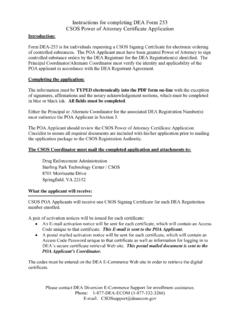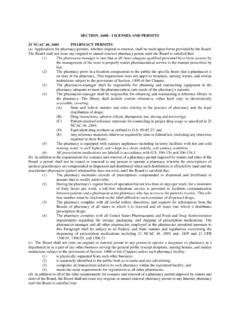Transcription of Briefing Note: Residential Possession Proceedings
1 Briefing Note: Residential Possession Proceedings _____ Gaby Hardwicke April 2017 1 Introduction Landlords frequently wish to recover Possession of a let Residential property if (a) the tenant is in arrears of rent, (b) the tenant has breached other terms of the tenancy agreement caused it to fall into disrepair or unlawfully sublet it, or (c) the landlord simply wants to sell the property. Frustratingly for landlords, the law in this area favours the tenant. It is not possible to simply gain Possession by re-entering your property and changing the locks. If you did, the tenant would have a strong claim against you for breach of the terms of the tenancy; namely, the covenant (agreement) for quiet enjoyment , and/or unlawful eviction and harassment.
2 This could lead to a damages claim or possibly a criminal conviction. There are potentially three steps to be taken to recover Possession : 1. Serving notice on the tenant that Possession is required ( the notice of Possession ); 2. Issuing a claim for Possession in the county court; and 3. Recovering Possession after judgment. Should the tenant fail to leave the property after the expiry of a notice of Possession , the proper procedure must be followed and you must obtain a Possession order from the court before trying to take back Possession . Even when the notice seeking Possession has expired, you do not have the right to evict the tenant without a court order.
3 After the court has made the Possession order, a bailiff s services may be required to recover Possession after judgment. This Briefing note should not be relied upon as legal advice and you should contact us for advice on your specific circumstances. notice of Possession Assured Shorthold Tenancies All assured tenancies entered into on or after 28 February 1997 are (except for a few limited exceptions) automatically assured shorthold tenancies ( AST s). It is therefore likely that your tenancy agreement with a Residential tenant is an AST. Broadly speaking, there are two types of notice which may be used to recover Possession of a property let on an AST: a section 21 notice (a no fault notice ) and a section 8 notice (a fault notice ).
4 section 8 fault notice A section 8 notice is generally used where the tenant is in breach of terms of the tenancy, most commonly unpaid rent. The section 8 notice informs the tenant that the landlord intends to bring Proceedings for Possession of the property on the grounds specified in the notice . The notice states the earliest date that Proceedings will begin. Generally, the most common grounds relied upon are that the tenant has accumulated substantial rent arrears at the time of deemed receipt of the notice and at the date of the hearing; the tenant has persistently delayed in paying the rent due; and any obligation of the tenancy (other than non-payment of rent) has been broken.
5 After expiry of the notice you may issue court Proceedings for recovery of Possession from the court. If a claim is not issued within 12 months of the notice being served, it becomes invalid and a fresh notice will need to be served before Proceedings can be issued. The notice is in a prescribed form and you must use the latest form. Briefing Note April 2017 For detailed advice on all Residential Possession Proceedings please contact: Daniela Catuara Associate Solicitor 01323 435955 Briefing Note: Residential Possession Proceedings _____ Gaby Hardwicke April 2017 2 section 21 no fault notice The tenant does not need to be in breach of the terms of the tenancy for service of this notice .
6 After the expiry of the notice , you can issue court Proceedings for an order to recover Possession from the court. There used to be two types of notice depending on whether you are terminating: 1) a fixed term tenancy or a tenancy that has continued after expiry of the fixed term; or 2) a tenancy that has only ever been a periodic tenancy a tenancy that runs from one period to another such as from week to week, month to month or year to year and has never had a fixed term. In some cases the landlord will need to calculate the last day of a period of a tenancy and this date will need to be specified in the notice . Since 1 October 2015 (and for new tenancies commencing on or after 1 October 2015) there is now only one type of section 21 notice to serve on a tenant and it must be in the new prescribed form.
7 Legal advice should be sought on the appropriate notice and its validity. In order to ensure that you serve a valid notice you must check that you: 1. have properly protected any tenancy deposit (if appropriate) or returned it to the tenant; 2. have provided the tenant with the requisite information about the deposit known as prescribed information ; 3. have (at no charge to the tenant) provided the tenant with an energy performance certificate (EPC) (for tenancies commencing on or after 1 October 2015); 4. have provided the tenant with a valid gas safety certificate (for tenancies commencing on or after 1 October 2015); 5. have provided the tenant with the leaflet published by the Department for Communities and Local Government entitled How to rent: The checklist for renting in England (for tenancies commencing on or after 1 October 2015); 6.
8 Have not served a notice before you are entitled to do so. You are not entitled to serve a section 21 notice on a tenant where they have resided in the property for 4 months or less (for tenancies commencing on or after 1 October 2015); 7. have licensed the property if you are obliged by your local authority to do so; and 8. are not prevented from retaliatory eviction , also known as revenge eviction (for tenancies commencing on or after 1 October 2015).. Failure to ensure all the requirements are met will render a s21 notice invalid. In addition, there is an obligation on private rented sector landlords in England to install smoke and carbon monoxide alarms in premises used as living accommodation.
9 This will apply even if the tenancies were granted before 1 October 2015. There is however an additional obligation in relation to tenancies granted on or after 1 October 015 to ensure that those smoke and carbon monoxide alarms are in proper working order at the start of any new tenancy. Failure to comply with this legislation could result in a penalty charge of up to 5,000 per breach but this will not affect the validity of a notice . Comparison between the two types of notice The advantages of a s8 notice are: a) The most common grounds, non-payment of rent and breach of another term of the tenancy, mean you only have to wait 14 days after the deemed date of receipt by the tenant of the notice of Possession .
10 There are no complex calcuations as to the last day of the period of the tenancy , which will still be relevant for some section 21 notices. Briefing Note: Residential Possession Proceedings _____ Gaby Hardwicke April 2017 3 b) Service of the notice on a fault basis can bring to the tenant s attention breaches of the tenancy. The requirement for the tenant to leave the property at short notice may focus his or her mind more quickly on finding alternative accommodation than with a s21 notice . c) You are not precluded from recovering Possession on this type of notice even if the tenancy deposit requirements and/or other regulations such as gas safety certificate or energy performance certificate have not been complied with.









